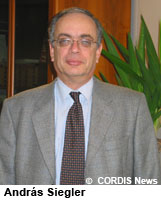András Siegler looks forward to increased international collaboration in FP7
Following what András Siegler terms 'a steep learning curve' for DG Research during the Sixth Framework Programme (FP6), the DG's Director for International Scientific Cooperation has plans for bigger and better international cooperation (INCO) activities in FP7. International cooperation in research is now more important than ever, according to Dr Siegler. 'At a time when globalisation is every day in the newspapers, it's not very difficult to see that the internationalisation of research is also a very present phenomenon,' he told CORDIS News. At a time when research is being outsourced more and more, increasingly to emerging economies, Europe has an interest in keeping activities such as research, which Dr Siegler calls 'high value activities', within its borders. But it is not enough for Europe to simply retain what it has, as the continent is lacking in highly qualified researchers, says Dr Siegler. This is one of the principal reasons for Europe looking beyond its shores and identifying talent in the rest of the world. 'The goal is not brain drain,' the Director emphasised, 'but to identify tasks where Europe and other countries have an equal interest.' Europe cooperates with its competitors because 'we need critical mass, because we would like to influence their research policies, we would like to take on board their scientific excellence,' says Dr Siegler. But the reasons are not all economic - Europe also works together with its competitors because it wants to meet global challenges. Dr Siegler gave the examples of avian influenza, food security and global change, all of which require international cooperation if they are to be addressed. International research collaboration assists the EU in fulfilling its commitments, for example in development, aid, external affairs, and security. 'Science and technology can contribute to all of these,' says Dr Siegler. During his first year with the European Commission, he has become aware that this contribution is widely acknowledged by the other DGs, and by policy makers, he says. Under FP6, INCO had a budget of 660 million euro, of which 60 million was allocated to support international mobility. The remaining 600 million was divided in two: 315 million euro was envisaged for collaboration with developing countries and the EU's neighbourhood policy countries in areas corresponding to the regions' needs, as identified by an appointed platform. The other 285 million euro was termed a 'policy target', and was to be used within the thematic priorities of FP6 via projects taking on board third countries. This was the first time that the entire programme has been opened up to third countries. The target was not met, although the steep learning curve has resulted in increased third country participation in the second half of FP6. The Commission recently published a top-up call, 'designed to improve the situation,' says Dr Siegler, which allows projects that are currently in the pipeline or have a minimum of 18 months remaining, to apply for funding to invite third country partners to join. Dr Siegler expects a huge interest in the call, which closes on 16 May. The precise contents of FP7 are yet to be finalised, but with an overall budget increase more or less assured, INCO is likely to benefit from greater funds. There will again be two chapters under INCO, says Dr Siegler, corresponding to the two sections under FP6 that shared 600 million euro between them. Referring to the opening up of the whole of the Framework Programme to third countries, Dr Siegler said that, in his opinion, this sort of collaboration 'should happen in an organic way, when both partners find a mutual interest'. This funding will be provided under the 'Coordination' section of FP7. A new initiative in FP7, also in this section, will be a platform enabling Member States to learn from one another's bilateral research activities, and to exploit synergies, the Director explained. Under the 'Capacities' strand of FP7, the Commission has plans for 'INCO-NETs', which will be very similar to the current ERA-NETs, says Dr Siegler. These will enable third countries to participate as equal partners with equal rights. 'We want to treat them as grown ups,' said Dr Siegler. Under 'Ideas', it is 'implicitly possible' that third countries will be able to access funding from the European Research Council (ERC). Dr Siegler emphasised that basic research is international by nature, but added that he would not like to pre-empt the discussions that will take place within the ERC itself. In the fourth and final pillar of FP7, 'People', there will be more grants to support international placements, and more return grants to assist those researchers who would like to return to their home country. Finally, the Commission wishes to create and strengthen links with expatriate European researchers, and is thus establishing 'ERA-LINK'. The initiative will open communication channels and raise awareness of opportunities in Europe. With the framework programmes now fully open to third country researchers, one may wonder whether Science and Technology (S&T) Agreements are still relevant. Dr Siegler believes so. A number of countries are still interested in signing such an agreement, which, Dr Siegler considers, helps to structure collaboration and set the conditions for intellectual property rights (IPR). 'I would like to see more flesh on them under FP7. They show political will and are a basis for exchanges and reciprocity,' he says.

